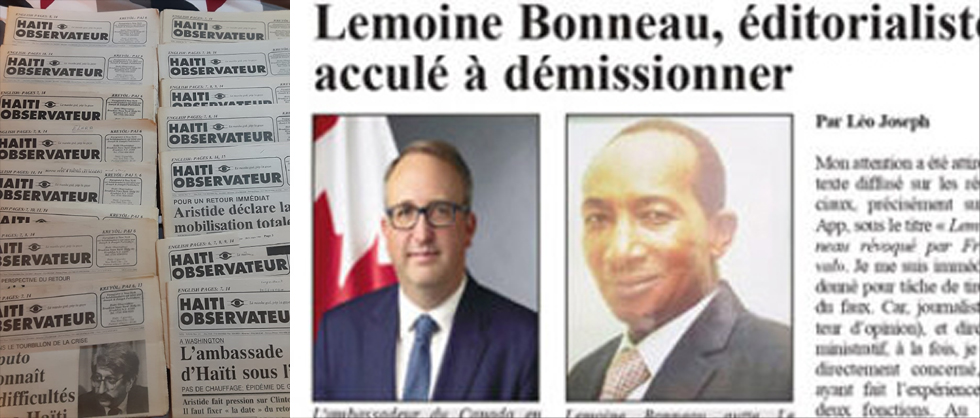EDITORIAL
- Delinquent government in power in Haiti par Editor
Insofar as the President and the Prime Minister, the two highest authorities of the Executive, are united in their actions and decisions, they share the accusations, as well as the congratulations awarded to them. By virtue of this principle, ministers and secretaries of state also share the blame. Here, then, is a country under the leadership of a delinquent government. Having been sworn in, while he was under indictment for money laundering, there were charges against Jovenel Moses. However, we did not know that he was going to find such a homogenous team to implement his rogue policy, which was implemented smoothly and never with conflicting notes from the men and women in power. In addition, with the help of corruption, he was able to keep pace with those who pretended to be people of integrity.
Indeed, since the swearing in of Mr. Moses on February 7, 2017, to this day, we have not stopped counting the criminal acts and decisions that have marked his administration. Worse still, having subjugated the judicial system, he has used the powers of the presidency to protect himself and the presidential family. He was careful to extend these protective measures to his close associates, political allies and friends. However, above all, the judicial scandals have dominated the news in recent days.
Indeed, the scandal that made the headlines this past week was the bloody beating inflicted on Patrick Benoit at his residence in Vivy Mitchel, a posh neighborhood in the heights of Pétion-Ville. Accompanied by a mixed team of uniformed and plainclothes policemen, whom Justice of the Peace Ricot Vrigneau let loose on him, at the moment of his arrest, in the context of a land conflict, the victim was mistreated and then deposited in a police station bathed in his blood. Judged too ill to keep him in custody, the commissioner immediately released him from custody, from where he was taken to hospital by his relatives. This event draws attention, first, to the judge's behavior. It also highlights a practice that was common under the Duvalier regime, but which was interrupted following a wave of judgments handed down against these spoliators after the fall of the tyrannical regime. It took the advent of Michel Martelly, a follower of Duvalierism, to revive this practice. Worthy political heir of the first PHTKist president, Jovenel Moïse puts at ease the usurpers of property as well as the judges who make these judgments illegal in their favor. Clearly, Judge Vrigneau committed this act of banditry with full knowledge of the facts, as he was assured of the impunity provided by the Bald-Headed regime led by Moïse.
One cannot help but see the personal exploitation of justice by Jovenel Moïse using the Minister of Justice as his attack dog, which he launches after his political enemies. The most recent case to date is that in which the Director General of the Central Anti-Corruption Unit issued a wanted notice against the Administrative Director of the National Haitian Defense Network (RNDDH). The case is sewn together. It involves Jovenel Moïse using the ULCC through Marie Yolène Gilles, president of a rival human rights organization, "Fondasyon je klere" (FJK), together with lawyer Samuel Madistin, to persecute Pierre Espérance. In short, the Haitian president intends to take revenge on Mr. Espérance for participating in a special hearing of the U.S. Congress on Haiti, which resulted in a virulent report on the Bald-Headed government, at the height of the opposition's mobilization against Jovenel Moïse.
Another recent intervention by the latter in response to the stench of persecution of the opposition is the arrest of Macsen Dérilus, the deputy coordinator of the political party Haiti in Action (Creole acronym AAA,) of which Senator Youri Latortue is the national coordinator. Strongly protesting against Mr. Dérilus' incarceration, Mr. Dérilus denounces an act committed illegally, as no charges were brought against the AAA's Deputy Coordinator. This is yet another example of the Haitian justice system being controlled by the head of state.
Throughout Jovenel Moïse's presidency, there has been one drift after another. For he was a master in such actions. He intervenes at every opportunity to free his friends and allies from the clutches of justice. Let us mention, for example, the case of Senator Rony Célestin, a political ally of the occupier of the National Palace. Intercepted by a police patrol on board his vehicle, which had been involved in at least one kidnapping, Me Célestin was stopped by the police, who roughed him up somewhat, after he refused to identify himself. He was taken to a police station from where he was released after declaring his identity. Thanks to Jovenel Moïse, a potential kidnapper is still on the streets.
The biggest legal conflict in which the Head of State got involved in order to dictate his verdict to the justice system remains, without a doubt, the electricity case, a case in which he declared himself judge and party. Disregarding all the legal provisions on the matter, he ordered the Minister of Justice to unilaterally cancel the contract between the Haitian State and the electricity supply companies. In this case E-Power, Haitian Tractor and SOGENER. However, the lightning bolt of Jovenel Moïse struck above all the latter. He accused this company of having benefited from a contract costing USD 12-million a month to the Haitian. Though it was legally signed with the government of President René Préval, this company saw the latter's hatred unleashed against its leaders, including the Vorbe brothers (Dimitri and Jean-Marie) as well as President Préval's widow, Élisabeth Desbrosses-Delatour-Préval, all of whom were the subject of warrants to bring in. However, above all Dimitri Vorbe was in Mr. Moïse's sights. He therefore thought it wise to go into exile to avoid landing in prison. While waiting for the conditions to be met for true justice to have the last word, injustice and arbitrary rule, under the dictates of Jovenel Moses, were to prevail.
It seems that the current president feels comfortable being on the wrong side of the law, whatever the nature of the offence. While political leaders generally flee drug traffickers like the plague, like his predecessor, he makes them his acolytes and close collaborators. His entourage therefore includes senators and parliamentarians who are deeply involved in the drug trade or other illicit activities. No doubt he could not intervene to prevent his friend, Jean Fenel Thanis, deputy of the 49th Legislature, representing the jurisdiction Cayes-Île à Vache, intercepted by a patrol of the Anti-Drug Brigade (French acronym BLTS,) March 6, 2019, ended up in the prison of Croix des Bouquets. However, he was able to find the right formula, a year later, to free him. According to judicial sources, Mr. Thanis benefited from a & quot; habeas corpus procedure & quot;, which, however, is not part of the regular protocol. The authorities have pretended to ignore everything
in this operation. That is why two members of the Public Prosecutor's Office of Croix des Bouquets were placed on leave " without pay". In a country where the authorities have a holy horror of transparency, nobody will know how this case will end. However, we know that no decision has been taken to return the former MP to prison. Clearly, such a provision remains irreversible.
In light of all these facts, in addition to others that have not been reported here, Jovenel Moïse took up residence at the National Palace with the aim of dismantling Haitian society, the judicial system in particular. This is a man who was elected using subterfuge, thus giving change to the 500,000 citizens who gave him their votes, out of a total of approximately 5,838,838 of voting age who turned down his candidacy. How then can one want to impose such an impostor on the vast majority of the Haitian people? It is more than legitimate for them to give themselves the means to get rid of it. Without wasting time!
cet article est publié par l’hebdomadaire Haïti-Observateur, VOL. L No.18 New York, édition du 20 mai 2020 et se trouve en P.11 à : http://haiti-observateur.ca/wp-content/uploads/2020/05/H-O-20-mai-2020-1.pdf










